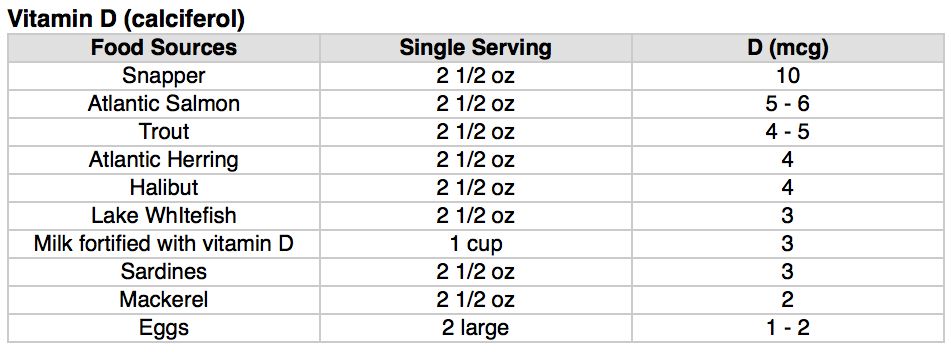Vitamin D Health Benefits and Food Sources
Through looking at an essential nutrients role in health and its characteristics of deficiency, one can come to appreciate its value in good nutrition.
Vitamin D Role in Health
Vitamin D supports healthy bones and teeth; as well helps the body to absorb calcium and phosphorus. Vitamin D is also involved in regulating the immune system and cells. Vitamin D is fat-soluble, and is stored in the body when your skin is exposed to sunlight and absorbed when eating some foods. Research suggests that by getting enough vitamin D a person can lower their risk of developing cancer and multiple sclerosis.
Characteristics of Vitamin D Deficiency
A vitamin D deficiency in children can result in rickets, a disease that causes soft, weak bones. Not getting enough vitamin D (sunlight) can also result in the softening of bones in adults which can lead to osteoporosis and other bone disorders. Symptoms of a vitamin D deficiency are characterized by weak achy bones and muscle weakness.
Deficiencies can occur when a person is not absorbing enough sunlight into the skin. It is recommended the average person gets 20 to 30 minutes of sunlight on exposed arms and legs every day. People with darker skin pigmentation do not absorb sunlight as easily as those with lighter skin, so must be in the sunlight longer. The elderly and people living in northern areas are at higher risk of a vitamin D deficiency.
Vitamin D Food Sources
Vitamin D is best absorbed through sunlight, but there are other good sources where this essential nutrient can be found. Most fish are an excellent source of this vitamin, along with eggs. Since milk is often fortified with vitamin D, it also becomes an important source for this essential nutrient.
Nutrient-Rich Whole Food Sources for Vitamin D

This chart lists the best food sources for vitamin D, along with that food source’s single serving size and the amount of vitamin D in that single serving.
Vitamin D Daily Intake Recommendations for Child and Adult

These figures are referenced from the Dietary Reference Intake (DRI) 2005 system; used in Canada and the United States. The DRI system provides the minimum daily intake requirements of vitamins, minerals and nutrients for child and adult; males and females.
Written by: J. Marshall from http://nutritionalhealingrecipes.com